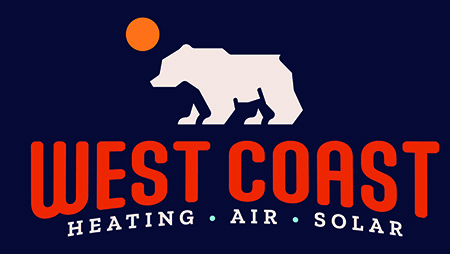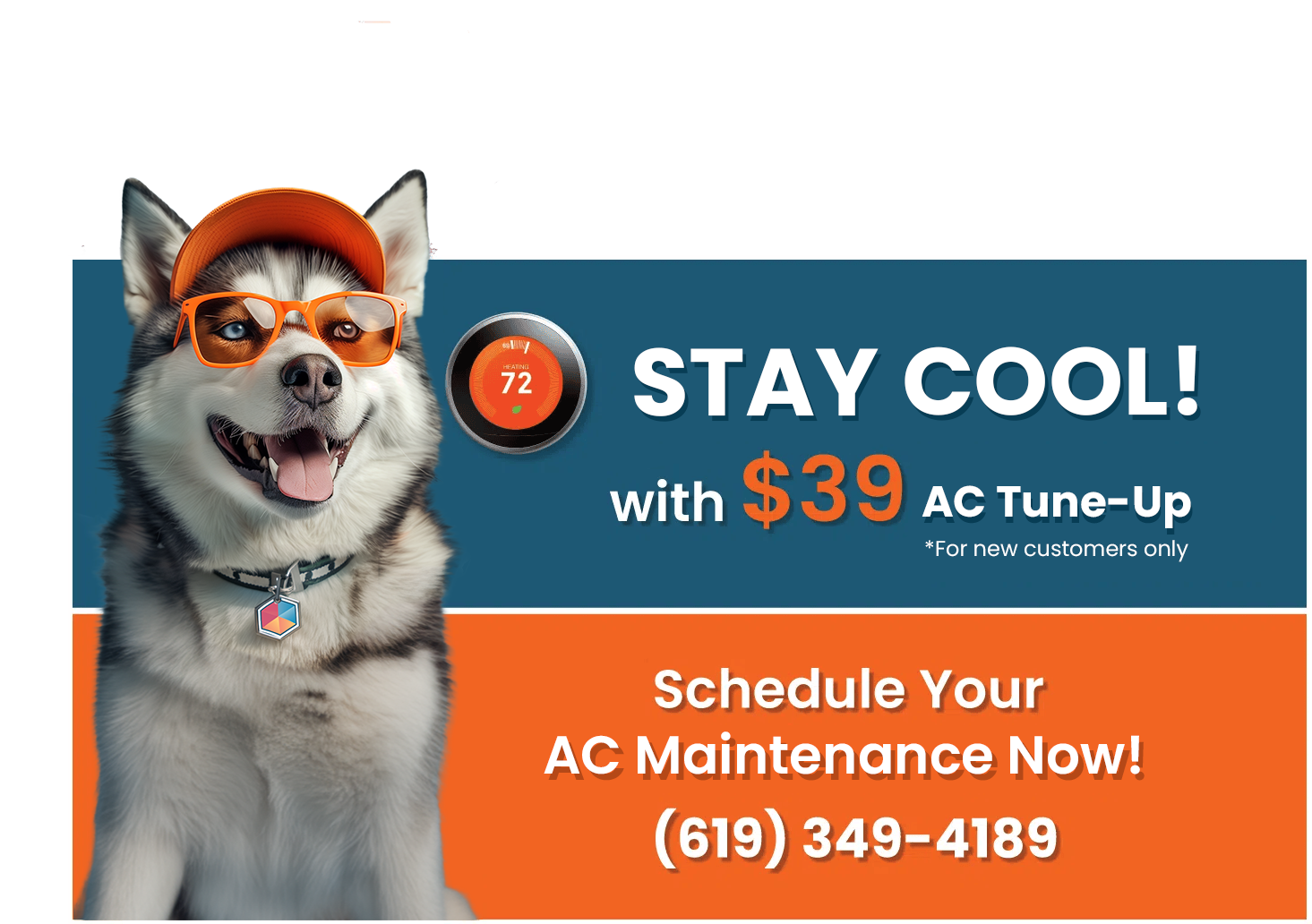Solar Inverter in Poway, CA
Breathe easy, knowing our air quality services are designed to foster a healthier and safer living environment in your home. Trust us to help you breathe better, one service at a time.
Expert Solar Inverter Services in Poway: Maximize Your Energy Production
For homeowners in Poway harnessing the power of the sun, your solar panels are just the beginning. The unsung hero working tirelessly behind the scenes is the solar inverter. This critical component converts the direct current (DC) electricity generated by your panels into usable alternating current (AC) electricity that powers your home and can be sent back to the grid. Without a properly functioning, high-quality inverter, your solar system can’t perform at its peak.
At West Coast Heating, Air Conditioning and Solar, we understand the vital role of the inverter in maximizing your solar investment. We offer comprehensive solar inverter services in Poway, from expert installation for new systems to reliable repair, maintenance, and replacement for existing ones. Ensure your Poway solar system is running efficiently and reliably with our local expertise.

What is a Solar Inverter and Why is it Crucial?
Think of the solar inverter as the brain and heart of your solar power system. Solar panels produce DC electricity, but your home appliances and the local power grid use AC electricity. The inverter’s primary job is to seamlessly and efficiently convert this DC power to AC power.
Beyond simple conversion, modern inverters play several other crucial roles:
- Maximizing Power Output: Advanced inverters use Maximum Power Point Tracking (MPPT) technology to constantly adjust and optimize the amount of power harvested from your panels, regardless of changing conditions like temperature or partial shading.
- System Monitoring: Many inverters provide detailed data on your system’s performance, allowing you to track energy production, identify potential issues, and understand your energy consumption patterns.
- Safety Features: Inverters include safety mechanisms like rapid shutdown, which is essential for the safety of utility workers and emergency responders.
- Grid Connectivity: Grid-tied inverters synchronize with the utility grid, ensuring your solar power is compatible and can be seamlessly used or exported.
Choosing the right inverter and ensuring it’s expertly installed and maintained is fundamental to the efficiency, safety, and overall return on investment of your solar system in Poway.
Understanding Your Solar Inverter Options
Not all solar systems are created equal, and neither are their inverters. The best type of inverter for your Poway home depends on various factors, including your roof layout, potential for shading, system size, budget, and future energy goals (like adding battery storage). Here’s a breakdown of the most common types:
1. String Inverters
- How they work: Panels are wired together in “strings,” and each string connects to a single central inverter. The inverter processes the DC power from the entire string.
- Pros: Generally the most cost-effective option upfront, well-established technology, easier troubleshooting as there’s one central point.
- Cons: Performance of the entire string is limited by the lowest-performing panel (e.g., if one panel is shaded, the output of all panels in that string is reduced). Less detailed panel-level monitoring.
- Ideal For: Simple roof layouts with uniform sun exposure and minimal to no shading issues throughout the day.
2. Microinverters
- How they work: A small inverter is installed underneath each solar panel. Each panel’s DC output is converted to AC individually at the panel level.
- Pros: Maximizes production on roofs with shading or multiple orientations – if one panel is shaded, the others are unaffected. Provides panel-level monitoring. Easier to expand the system one panel at a time. Enhanced safety features (DC power is converted to AC at the panel).
- Cons: Higher upfront cost due to needing one inverter per panel. Installation can be more complex.
- Ideal For: Roofs with complex angles, multiple small sections, or significant shading challenges in Poway.
3. Power Optimizers
- How they work: These devices are installed at the panel level (like microinverters) but they don’t convert DC to AC. Instead, they condition and “optimize” the DC power from each panel before sending it to a central string inverter.
- Pros: Combines some benefits of both string inverters and microinverters. Mitigates the impact of shading on individual panels. Provides panel-level monitoring. Can be less expensive than a full microinverter system while offering panel-level optimization.
- Cons: Requires both optimizers on the roof and a central string inverter.
- Ideal For: Systems that need panel-level optimization but prefer the central inverter setup or cost structure.
4. Hybrid Inverters
- How they work: These inverters function like standard grid-tied inverters but also have built-in battery charge controllers. They can manage power flow between solar panels, a battery bank, your home, and the grid.
- Pros: Essential for integrating battery storage into your solar system, allowing you to store excess solar energy for use later (e.g., during peak hours or power outages). Simplified system design when adding storage.
- Cons: Higher upfront cost compared to standard grid-tied string or microinverters. More complex technology.
- Ideal For: Homeowners in Poway looking to add or plan for battery storage, especially relevant under changing net metering rules like NEM 3.0, which incentivizes self-consumption and storage.
Choosing the Right Inverter for Your Poway Home
Selecting the optimal inverter involves considering factors specific to your property in Poway:
- Roof Characteristics: Is your roof simple and south-facing, or does it have multiple angles, dormers, or chimneys causing shade?
- Shading: Are there trees, buildings, or other obstructions that cast shadows on your roof at different times of the day or year? Microinverters or power optimizers are often better for shaded systems.
- Budget: Upfront costs vary significantly between inverter types.
- Future Goals: Do you plan to add a solar battery system? A hybrid inverter is usually necessary for seamless battery integration.
- Monitoring Needs: Do you want to see the performance of each individual panel? Microinverters and optimizers offer this capability.
Our experts serving the Poway area can assess your specific needs and recommend the inverter technology that will deliver the best long-term performance and value for your home.
Inverter Lifespan, Monitoring, and Maintenance
Like any electronic component, solar inverters have a lifespan and require proper care. While typical string inverters might last 10-15 years, microinverters and power optimizers often come with longer warranties (20-25 years) aligning more closely with the solar panels themselves.
Signs that your inverter might be experiencing issues or nearing the end of its life include:
- Decreased energy production compared to historical data.
- Error messages or warning lights on the inverter display or monitoring app.
- System frequently shutting down.
- Visible signs of wear or damage.
Regular monitoring of your solar system’s production is key to catching potential inverter issues early. While solar systems generally require minimal maintenance, including the inverter in routine checks can help ensure optimal performance and longevity. If you notice any issues or suspect your inverter isn’t performing correctly in your Poway home, it’s time to call a professional.
Our Professional Solar Inverter Services in Poway
West Coast Heating, Air Conditioning and Solar is your trusted partner for all your solar inverter needs right here in Poway. Our certified and experienced technicians specialize in:
- New Solar Inverter Installation: Ensuring your chosen inverter type is correctly and safely installed as part of your new solar system, perfectly integrated with your panels and electrical grid connection.
- Inverter Replacement & Upgrades: If your current inverter is old, malfunctioning, or you want to upgrade (e.g., to a hybrid inverter for battery storage), we provide seamless replacement services, handling the entire process from selection to installation.
- Inverter Repair & Troubleshooting: Diagnosing issues with your existing inverter and performing necessary repairs to restore your system’s performance quickly and efficiently.
- System Performance Checks: Evaluating your entire solar system, including the inverter, to ensure everything is working optimally and maximizing your energy production.
We work with reputable inverter brands known for their reliability and efficiency, ensuring you get a high-quality component that lasts.
Why Choose West Coast Heating, Air Conditioning and Solar in Poway?
When it comes to something as critical as your solar system’s inverter, you need a local team you can trust. For over 28 years, West Coast Heating, Air Conditioning and Solar has proudly served San Diego County, including the Poway community.
- Local Expertise: We understand the specific energy needs and conditions in the Poway area.
- Experienced Technicians: Our team is highly trained and certified in the latest solar technology, including all types of inverters.
- Commitment to Quality: We use reliable equipment and adhere to the highest standards of installation and service.
- Customer Satisfaction: We have a long history of Reviews from satisfied customers throughout the county who have experienced the West Coast difference.
- Comprehensive Service: Beyond inverters, we are a full-service HVAC and solar company, meaning we understand your home’s entire energy ecosystem.
- Flexible Options: Explore our Financing solutions to make your solar inverter project more affordable.
We are dedicated to helping Poway residents get the most out of their solar power systems through expert inverter services.
Get Started with Your Poway Solar Inverter Project
Don’t let a sub-optimal or malfunctioning inverter limit your solar savings and energy independence. Whether you’re installing a new system, need a repair, or are considering an upgrade in Poway, West Coast Heating, Air Conditioning and Solar is ready to help.
Contact us today to learn more about our solar inverter services or to schedule a consultation. We’ll assess your needs, explain your options, and provide a solution tailored to your Poway home.
Frequently Asked Questions About Solar Inverters
What is the best solar inverter company?
A: There are several reputable solar inverter manufacturers globally. The “best” often depends on the type of inverter (string, micro, hybrid) and specific system needs. We partner with leading brands known for their performance and reliability.
What are the disadvantages of a solar inverter?
A: The main “disadvantage” is that it’s a potential point of failure in a solar system as it contains electronic components that wear out over time. Older or less efficient inverters can also lead to lower energy production compared to advanced models. Choosing a quality inverter and ensuring professional installation and maintenance helps mitigate these concerns.
How long does a solar inverter last?
A: The lifespan varies by type. String inverters typically last 10-15 years, while microinverters and power optimizers often have warranties extending to 20-25 years. Proper ventilation and protection from extreme weather can help extend life.
Which type of solar inverter is best?
A: There’s no single “best” type for everyone. String inverters are cost-effective for simple, unshaded roofs. Microinverters and power optimizers are better for complex roofs or those with shading. Hybrid inverters are necessary if you plan to add battery storage, especially relevant with NEM 3.0. We can help determine the best fit for your specific situation in Poway.
Can I replace my solar inverter myself?
A: No, solar inverter installation, repair, and replacement involve high-voltage electricity and complex wiring that require specialized knowledge and certification. It is dangerous and should only be performed by qualified professionals to ensure safety, system functionality, and warranty validity.
How does NEM 3.0 affect inverter choice?
A: NEM 3.0 significantly changes how you are credited for excess solar energy sent to the grid, making it more beneficial to consume your solar power directly or store it for later use (e.g., with a battery). This makes hybrid inverters, which facilitate battery integration, a more attractive option for many homeowners planning new systems or upgrades under NEM 3.0.

